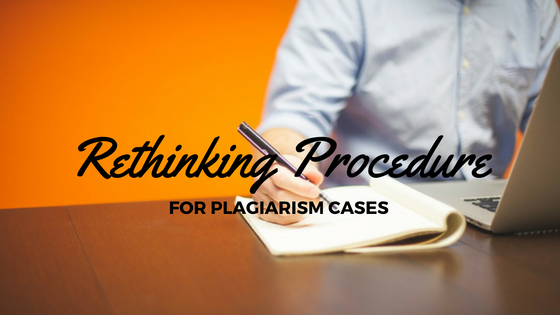
At the end of October, an undergraduate student from Suffolk University was accused of plagiarism for the use of the word “hence.” Scrawled next to the word in question was the sentence: “This is not your word.” The student, Tiffany Martinez, would later confide: “I am hurting because my professor assumed that the only way I could produce content as good as this was to ‘cut and paste.’ I am hurting because for a brief moment I believed them” (Jaschik, 2016). This incident has incited some necessary self-reflection in the realm of higher education on proper teaching methods for a diverse group of students. Neglected, however, is a broader conversation of how incidents such as these require rethinking how academia handles plagiarism.
The age-old “trick” for detecting plagiarism is by comparing a student’s most recent writing with their previous work. While leading a workshop on plagiarism in student writing, Inside HigherEd writer, Nate Kreuter, recalls that he was taken aback when a professor insisted that possible plagiarizers should be confronted after a dramatic improvement in their work. He writes, “The implication is that instructors have some sort of intuition for what an individual student’s capabilities are. How are instructors to know an individual student’s capabilities? What if the student wrote a horrible initial paper, perhaps because of distractions unknowable to us as instructors, and subsequently got his or her act together and wrote a stellar paper?” (Kreuter, 2013). In many cases (certainly in the case of Tiffany Martinez), hasty actions have the grave potential for hurtful, unwarranted accusations.
So, when would be a necessary moment to approach students about plagiarism? Nate Kreuter insists that actions should not be taken until there is absolute proof. “I wouldn’t even consider scheduling a conference with the student about the possibility of plagiarism unless I had airtight evidence, the sort of proof that I would be willing to present to a disciplinary committee. In addition to the fact that accusing or questioning a student about plagiarism without any evidence could expose you to legal liability, the more likely problem is that after a wrongful or unsubstantiated accusation, the student will be lost to you. Forget about imparting any lessons after that conversation” (2013).
Tiffany Martinez’s case is certainly an exceptional one, as an accusation of plagiarizing a single word-“hence”-denotes serious systemic issues of underestimating a student’s capabilities. However, this is also largely in part due to the common “I know it when I see it” mentality surrounding plagiarism that has been long cherished in academia. Unless you can build a serious case against a student for plagiarizing, it is unnecessary to be confrontational in their sudden improvement, which can possibly be explained by other extraneous factors. Always take care while proceeding in plagiarism cases, as they should closely follow your institution’s policies for academic dishonesty. If you have any questions, inquire with your administration, supervisors, or academic chairs to ensure proper procedure is being taken.
For further reading:

